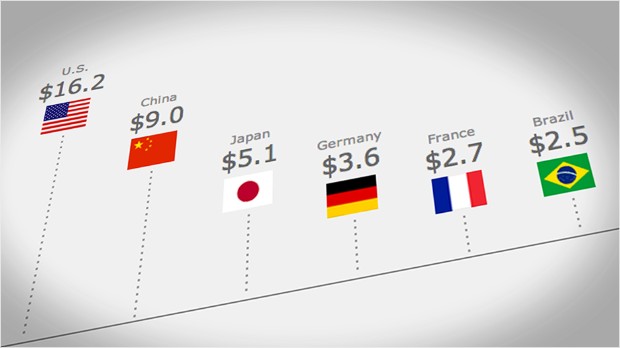
Click image for interactive on world's largest economies
LONDON (CNNMoney)
And much of the world is hooked on cheap central bank money.
That is the backdrop as finance officials from the world's leading nations meet on Thursday and Friday in Washington to debate what's next.
Among other things, they are expected to examine the risks of continuing to flood markets with cash. But they are likely to conclude that there's no alternative, for now.
Related: Debt's impact on growth: the debate rages
Austerity measures are sapping demand in many major economies. That leaves them reliant on ultra-loose monetary policy to promote activity -- a dependency that some fear is slowing the pace of reform, distorting currency and other markets and storing up future trouble in the form of asset price bubbles.
"There are some risks associated with some of the decisions that have been taken but my sense is the benefits far exceed the risks or the costs," International Monetary Fund chief economist Olivier Blanchard said this week in an interview with CNN.
The IMF cut its global growth forecast to 3.3% Tuesday, downgrading most countries.
Related: World's largest economies
The exception was Japan, which is now expected to grow by 1.6%, up from 1.2% just three months ago. The reason for Japan's turnaround is a bold combination of aggressive monetary stimulus and increased government spending launched by recently-elected Prime Minister Shinzo Abe.
Meanwhile, forced spending cuts will slow growth in the U.S., and a lack of demand in the eurozone will ensure a second consecutive year of recession.
Weaker than expected first-quarter growth in China leaves Japan as a rare bright spot, but its policies are being closely watched for any indication that they may spark a currency war.
Japan is planning to inject $1.4 trillion into its economy over two years by buying bonds and other securities in a bid to end deflation and years of stagnant growth. The yen has fallen 27% in the last six months, and the country's major trading partners are paying attention.
The U.S. Treasury Department last week struck a cautionary tone in its semi-annual report on currency practices.
"We will continue to press Japan to adhere to the commitments agreed to in the G7 and G20, to remain oriented towards meeting respective domestic objectives using domestic instruments and to refrain from competitive devaluation and targeting its exchange rate for competitive purposes," the report said.
Other recent comments from the European Central Bank, U.S. Federal Reserve and IMF suggest Japan is staying just the right side of the line.
"This may raise some expectation that recent yen weakness may not be center stage at the upcoming G20 finance ministers and central bankers meeting," noted fixed income strategists at Japanese investment bank Nomura. ![]()
First Published: April 18, 2013: 7:48 AM ET
Anda sedang membaca artikel tentang
Time for world to kick cheap money habit?
Dengan url
http://bolagaya.blogspot.com/2013/04/time-for-world-to-kick-cheap-money-habit.html
Anda boleh menyebar luaskannya atau mengcopy paste-nya
Time for world to kick cheap money habit?
namun jangan lupa untuk meletakkan link
Time for world to kick cheap money habit?
sebagai sumbernya
0 komentar:
Posting Komentar